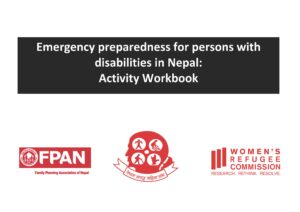Shaping the future: Our strategy for research and innovation in humanitarian response.

Shaping the future: Our strategy for research and innovation in humanitarian response.


We know that crises are especially devastating for the most vulnerable, isolated members of communities – including older persons and persons with disabilities. These individuals have specific needs and vulnerabilities that are only worsened amidst the breakdown of services during natural disasters and conflict. This includes protection and sexual and reproductive health (SRH) needs. To ensure that lifesaving SRH services are included in humanitarian response, the Women’s Refugee Commission (WRC) partners with communities to prepare for emergencies. We have found that people with disabilities and older people are consistently left out of emergency preparedness planning, so their unique needs and priorities go unaddressed.
The experiences of people with disabilities vary with age, and non-disabled people can acquire disabilities as they get older. Ability and age intersect with other identities to shape people’s needs and affect their access to critical health services. Emergency preparedness and humanitarian response must be designed and delivered in partnership with community members to ensure services are accessible and inclusive. We believe that older persons and persons with disabilities have unique expertise, wisdom, and perspectives on their communities. Their participation improves emergency preparedness and response.
Humanitarian agencies have developed numerous tools to assess risks and prepare for crises. While countless assessments have been conducted before and after emergencies, these assessments frequently fail to engage community members, who are best positioned to identify their own strengths, capacities, and resources. Community involvement ensures that preparedness and response activities strengthen existing systems, as well as building resilience for individuals and families.
In response to this gap, WRC has developed community capacity and needs assessment tools and piloted the Community Preparedness for SRH and Gender curriculum to support communities to identify their SRH needs and resources. WRC helps communities develop action plans to prepare for emergencies, protect vulnerable members, and ensure that SRH services are included in crisis response.
Nepal is highly vulnerable to natural hazards and disasters, including flooding, landslides, earthquakes, drought, and wildfires. In 2015, massive earthquakes struck Nepal, causing catastrophic damage and thousands of fatalities. This disaster was followed by massive flooding and landslides in 2019. In recent months, Nepal has suffered further flooding and landslides, against the backdrop of the global COVID-19 pandemic. The country is also at extremely high risk for climate-related disasters – which will only increase as climate change continues to disproportionately impact developing countries.
With generous support from Elrha, WRC, the Family Planning Association of Nepal, the Nepal Disabled Women Association, and the Senior Citizen Care Society are partnering with people with disabilities and older persons to conduct participatory research and learn more about their priorities for disaster preparedness and SRH services. Given the heightened risks that COVID-19 poses for these individuals, we developed workbooks to distribute to participants to complete at home. The workbooks include a range of drawing, mapping, ranking, and journaling activities. In addition to COVID-19 safety, the workbooks have the added advantage of enabling people with diverse disabilities to participate and share their experiences in a comfortable environment.
Our research will strengthen inclusion of older people and people with disabilities in emergency preparedness planning. We will develop recommendations to share with partners in other communities and countries to support local emergency preparedness activities that are accessible for people with disabilities and older people, inclusive of their priorities and needs, and leverage their expertise and leadership.
This blog post was written by Lily Jacobi. You can view the original shared by WRC on their website

 Please upgrade your browser
Please upgrade your browser
You are seeing this because you are using a browser that is not supported. The Elrha website is built using modern technology and standards. We recommend upgrading your browser with one of the following to properly view our website:
Windows MacPlease note that this is not an exhaustive list of browsers. We also do not intend to recommend a particular manufacturer's browser over another's; only to suggest upgrading to a browser version that is compliant with current standards to give you the best and most secure browsing experience.